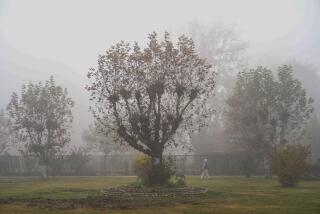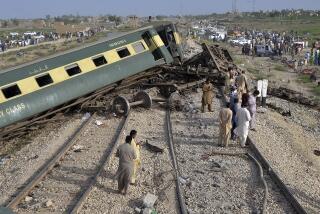Death Toll Rises to 120 in India Train Crash
KHANNA, India — A switchman frantically alerted the nearest rail station that the Frontier Mail had just derailed and was sprawled across the tracks of an oncoming express train. But it was too late.
The Sealdah Express had sped past the station and couldn’t see the derailed coaches in the darkness and mist early Thursday. The express train tore into the four disabled cars, killing scores of people.
The death toll climbed to at least 120 by today, police and railroad officials said. More than 250 were injured in the accident 150 miles northwest of the capital, New Delhi.
The sound of tearing, grinding metal woke residents of the nearby town of Khanna, sending them hurrying to the wreckage to extricate bodies and comfort the survivors.
Farmers turned on headlights of cars and tractors to illuminate the crash site as rescue workers cut open the mangled cars with acetylene torches. Others offered tea, bread and blankets to the stunned survivors, said Shiv Kumar, a businessman who joined the rescue efforts.
Hours after the accident, many people were still trapped inside the cars.
“They are shrieking. Some are saying, ‘Cut off my legs. Cut off my hands. Just rescue me,’ ” Kumar said.
The Frontier Mail was bound for Amritsar from the capital when its four rear cars jumped the tracks. The Sealdah Express, en route from Jammu to Calcutta, plowed into them less than a minute later, said Ashok Kumar, an official of the government-owned railroad company.
“I was awakened by a jolt as the train came to a screeching halt. Before I could realize what happened, the Sealdah Express came and collided with the derailed coaches,” said Usha Rani, who was on her way to a wedding.
A total of 1,700 passengers were aboard both trains. In all, 16 cars were damaged in the accident, the worst in three years in India, Ashok Kumar said at the crash site. He ruled out sabotage as a cause of the crash. “It was a purely mechanical problem.”
More to Read
Sign up for Essential California
The most important California stories and recommendations in your inbox every morning.
You may occasionally receive promotional content from the Los Angeles Times.










